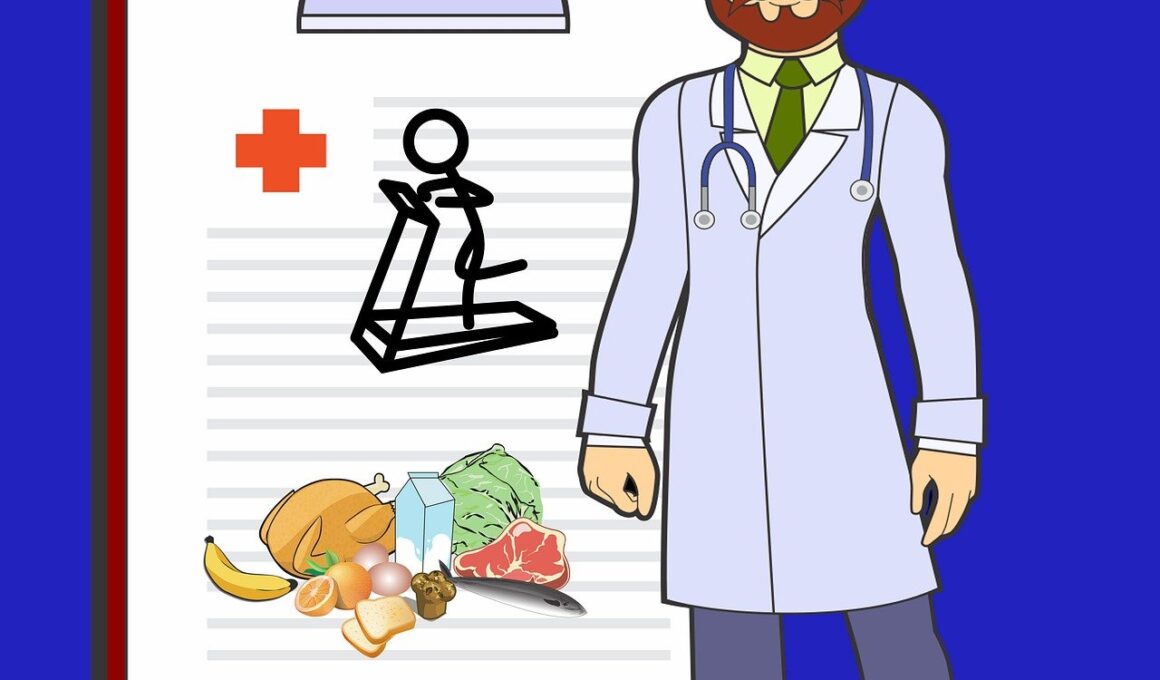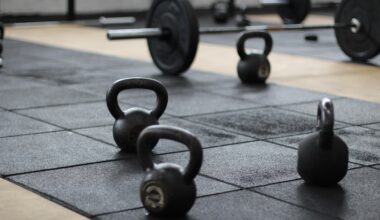Timing Your Meals for Maximum Recovery After Injury
Maintaining proper nutrition is essential in injury recovery, as it can aid healing and reduce inflammation. Meal timing significantly impacts the body’s natural recovery processes. When recovering from an injury, the timing of your meals becomes as important as what you eat. This means planning your eating schedule around your body’s needs can optimize recovery. Research indicates that consuming meals regularly, especially protein-rich foods, can facilitate muscle repair and recovery. Protein serves as the building blocks for muscle tissue, and consuming it strategically can help the body recover faster. Moreover, consuming meals that include healthy carbohydrates can help replenish energy reserves depleted during the injury process. Timing is crucial—eating carbohydrate-rich foods shortly after physical exertion can help restore lost glycogen. Recovery is not solely about what you eat; it also requires proper hydration. Water plays a critical role in nutrient absorption and facilitates metabolic processes. Restoring electrolyte balance through hydration supports overall recovery and decreases fatigue. Thus, adhere to a structured meal schedule to support your body during rehabilitation.
Incorporating nutrient-dense meals post-injury is vital for effective recovery. Prioritize nutrients such as vitamins, minerals, proteins, carbohydrates, and healthy fats in your meals. Vitamins and minerals like vitamin C and zinc play significant roles in healing tissues. Foods such as citrus fruits, berries, nuts, and green leafy vegetables are exceptional sources. These vitamins can enhance collagen synthesis, crucial for tissue repair. Furthermore, omega-3 fatty acids, found in fatty fish, walnuts, or flaxseeds, have anti-inflammatory properties. Eating lean proteins such as chicken, turkey, legumes, and tofu within two hours after an injury can benefit muscle repair. Don’t forget to include complex carbohydrates, which are essential for replenishing your body’s energy stores. Whole grains, quinoa, and sweet potatoes are excellent choices. Balancing these nutrients helps to maintain energy levels and supports overall health. Additionally, you should consider including antioxidants in your diet. Foods rich in antioxidants help to fend off oxidative stress from inflammation, accelerating recovery. Following these nutritional strategies can ensure your meals support optimal injury healing and recovery. Remember, however, that food choices combined with proper meal timing are paramount.
Pre- and Post-Workout Nutrition Timing
The importance of meal timing extends to pre- and post-workout nourishment, especially when recovering from injury. Having a well-structured meal plan helps fuel your body for rehabilitation exercises. A balanced pre-workout meal rich in carbohydrates ensures you have the energy necessary to partake in rehabilitation activities. Consuming this meal about two hours before your exercise is ideal for effective digestion. It can boost performance and enhance your commitment to the rehabilitation routine. For effective recovery, consuming protein and carbohydrates after workouts is critical. Aim for a meal filled with both within 30 to 60 minutes after physical activity. This approach will maximize muscle recovery and minimize soreness. Post-workout snacks can include smoothie bowls, protein shakes, or yogurt with fruit. The key is to provide your body with the nutrients it needs immediately after exertion. Also, don’t forget about your hydration strategy. Consuming enough water before, during, and after physical activity is crucial for optimal recovery. Staying hydrated helps all bodily systems function and expels toxins from the body. Therefore, meal timing must be strategically planned to enhance recovery during rehabilitation.
Individualizing your recovery meal plan according to your specific injury and overall health is essential. Factors such as age, fitness level, and specific injury type should influence your nutrition strategies. Consulting with a registered dietitian can provide personalized advice tailored to your needs. A professional can assist in creating a comprehensive plan that aligns with your rehabilitation goals. For instance, someone recovering from a muscle injury may require more protein to rebuild muscle than someone with a minor joint injury. Additionally, understanding the food synergy concept—whereby various foods consumed together yield greater health benefits—can enhance recovery results. Combining certain foods, such as pairing Vitamin C-rich foods with iron sources, can improve absorption and support better healing. Maintaining a food journal can also aid in tracking your meals, ensuring you adhere to your nutritional goals. This practice helps to reinforce healthy eating patterns and empowers you to make informed choices. Recovery from injury is multifaceted, involving nutrition alongside physical therapy. By keeping body demands in mind, you can create a flexible meal schedule that supports healing.
Hydration’s Role in Recovery
Hydration is often overlooked yet plays a crucial role in recovery, especially after an injury. The body uses fluids for numerous functions, including nutrient absorption, waste elimination, and regulation of body temperature. Adequate fluid intake not only supports these functions but also boosts the effectiveness of the nutrients consumed for recovery. When recovering from an injury, it’s crucial to ensure hydration is prioritized for optimal healing. Water and electrolytes must be properly balanced within the body for muscles and tissues to recover efficiently. During rehabilitation exercises, a loss of fluids through sweat must also be compensated. Dehydration can lead to increased fatigue, muscle cramps, and prolonged recovery times, which all hinder the healing process. The general recommendation is to drink at least eight 8-ounce glasses of water daily, but this may vary based on activity level and weather. For added benefits, incorporating electrolyte-rich beverages can help restore any lost minerals during workouts. Including fluids throughout the day—starting from morning to pre- and post-exercise—ensures optimal hydration. Ultimately, proper hydration contributes significantly to the body’s overall recovery efficiency and speed.
Rest, in conjunction with proper nutrition and hydration, is essential for optimizing recovery following an injury. Understanding the balance of physical activity, nutrition, and rest is crucial to healing effectively. Allocate time for both active and passive recovery strategies. Active recovery can involve light activities that promote blood flow, while passive recovery focuses on adequate sleep and rest periods. Sleep is essential for recovery, as it’s during sleep that the body repairs and regenerates tissues. The lack of quality sleep can hinder the recovery process, delaying healing times significantly. Therefore, aim for 7-9 hours of quality sleep every night. Establishing a regular sleep pattern by going to bed and waking up at the same time daily can improve sleep quality. Additionally, avoiding caffeine and electronic devices an hour before bedtime can enhance sleep quality. Incorporating relaxation techniques such as deep breathing again into your routine can also facilitate better sleep. Combining proper nutrition, hydration, rest, and exercise as part of your rehabilitation plan will pave the way for more effective recovery. Engage with your healthcare team regularly to assess your progress and adjust your strategies as needed.
Conclusion: Commitment to Recovery
Understanding the significance of meal timing, proper nutrition, hydration, and rest can lead to successful recovery after injury. Each element of recovery works hand in hand to ensure that the body can heal efficiently and effectively. By being intentional about what you eat and when you consume meals, you can create an environment conducive to healing. Moreover, committing to a structured meal plan and hydration schedule amplifies the benefits of your rehabilitation efforts. Recovery is a process that requires patience, self-discipline, and dedication to achieving optimal health. Continue to educate yourself on nutrition strategies tailored to your needs as every individual has unique requirements. Consult with healthcare and nutrition professionals to create a well-rounded recovery plan. Stay motivated by tracking your progress and celebrating milestones along the way. Remember that recovery is a journey, and each step taken contributes to better overall health. With consistent effort towards meal timing and recovery practices, you can not only recover faster but emerge stronger. Taking these steps will help you avoid future injuries, ensuring long-term physical well-being.
Throughout your recovery process, staying flexible and adapting your meal plan to your evolving needs can significantly increase your chances of a successful outcome. As your physical state changes, so should the food sources you choose. Listening to your body’s cues will guide you in adjusting your meals and quantities. Incorporate a variety of food options to ensure you meet all necessary nutrients for recovery. A diverse diet encourages a broader range of vitamins and minerals, each contributing uniquely to your overall healing. Discover new recipes, blend nutrients, and experiment with meal timing to find what best supports your body. In addition to being strategic with meal timing, prioritize emotional well-being as well. Nurturing your mental health during an injury recovery period is crucial. To this end, consider engaging in yoga, meditation, or journaling, which can promote relaxation and emotional resilience. Thus, a holistic approach to recovery empowers you while fostering both physical and mental health during challenging moments. Remember that recovery is your priority, and investing in quality nutrition, hydration, rest, and emotional care collectively fosters a more rounded healing experience.


